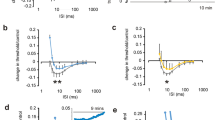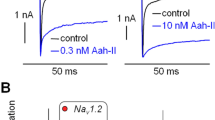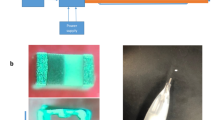Abstract
We have previously demonstrated that a drug which prolongs action potentials can, like a reduction in temperature, overcome conduction failure in demyelinated nerve fibres1. Although the particular substance then used, a scorpion venom, was not a suitable therapeutic agent, we suggested that other drugs, with similar but milder effects on the action potential, might be effective in the symptomatic treatment of multiple sclerosis2. We now report some encouraging results obtained with 4-aminopyridine (4AP), a substance which blocks the voltage-dependent potassium currents in squid giant axons3. The use of a potassium-blocking agent to prolong action potentials may seem surprising because we previously found tetraethylammonium chloride (TEA), another potassium blocker, ineffective on normal rat myelinated fibres1, and two recent voltage-clamp studies have confirmed that mammalian nodes have few, if any, potassium channels4,5. On the other hand, 4AP strongly potentiates transmitter release from the unmyelinated terminals of rat motor nerves6, and the possibility arose that demyelinated axon membrane, which can conduct impulses continuously like an unmyelinated fibre7, might further resemble its unmyelinated terminals by responding to 4AP. In testing this hypothesis, we have found that both TEA and 4AP prolong action potentials of demyelinated and unmyelinated fibres, and both facilitate conduction in fibres blocked by demyelination. 4AP is effective at lower concentrations, and is the more promising for clinical use, as it has already been used with beneficial effects in the treatment of Eaton-Lambert syndrome8 and myasthenia gravis9.
This is a preview of subscription content, access via your institution
Access options
Subscribe to this journal
Receive 51 print issues and online access
$199.00 per year
only $3.90 per issue
Buy this article
- Purchase on Springer Link
- Instant access to full article PDF
Prices may be subject to local taxes which are calculated during checkout
Similar content being viewed by others
References
Bostock, H., Sherratt, R. M. & Sears, T. A. Nature 274, 385–387 (1978).
Sears, T. A., Bostock, H. & Sherratt, M. Neurology 28, 21–26 (1978).
Meves, H. & Pichon, Y. J. Physiol., Lond. 268, 511–532 (1977).
Brismar, T. Acta physiol. scand. 105, 384–386 (1979).
Chiu, S. Y., Ritchie, J. M., Rogart, R. B. & Stagg, D. J. Physiol., Lond. 292, 149–166 (1979).
Lundh, H. Brain Res. 153, 307–318 (1978).
Bostock, H. & Sears, T. A. J. Physiol., Lond. 280, 273–301 (1978).
Lundh, H., Nilsson, O. & Rosen, I. J. Neurol. Neurosurg. Psychiat. 40, 1109–1112 (1977).
Lundh, H., Nilsson, O. & Rosen, I. J. Neurol. Neurosurg. Psychiat. 42, 171–175 (1979).
Rasminsky, M. & Sears, T. A. J. Physiol., Lond. 227, 323–350 (1972).
Bostock, H. & Sears, T. A. Nature 263, 786–787 (1976).
Author information
Authors and Affiliations
Rights and permissions
About this article
Cite this article
Sherratt, R., Bostock, H. & Sears, T. Effects of 4-aminopyridine on normal and demyelinated mammalian nerve fibres. Nature 283, 570–572 (1980). https://doi.org/10.1038/283570a0
Received:
Accepted:
Issue Date:
DOI: https://doi.org/10.1038/283570a0
This article is cited by
-
Human biodistribution and radiation dosimetry of the demyelination tracer [18F]3F4AP
European Journal of Nuclear Medicine and Molecular Imaging (2023)
-
Structure-activity relationship studies of four novel 4-aminopyridine K+ channel blockers
Scientific Reports (2020)
-
Effects of Fampridine in People with Multiple Sclerosis: A Systematic Review and Meta-analysis
CNS Drugs (2019)
-
Development of a PET radioligand for potassium channels to image CNS demyelination
Scientific Reports (2018)
-
Restoring Axonal Function with 4-Aminopyridine: Clinical Efficacy in Multiple Sclerosis and Beyond
CNS Drugs (2018)
Comments
By submitting a comment you agree to abide by our Terms and Community Guidelines. If you find something abusive or that does not comply with our terms or guidelines please flag it as inappropriate.



